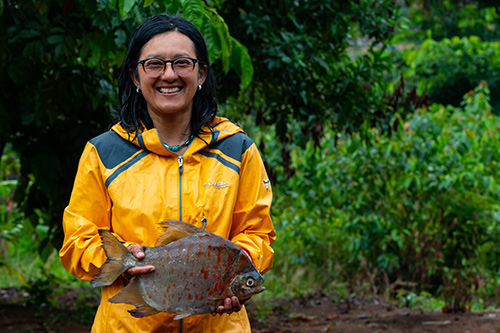MSU scientist’s work in Amazon River Basin featured at UN Climate Change Conference
Contact: Vanessa Beeson

STARKVILLE, Miss—A Mississippi State researcher is part of a historic scientific consortium presenting its findings on the Amazon River Basin at the 26th United Nations Climate Change Conference, or COP26, in Glasgow, United Kingdom.
Assistant Professor Sandra B. Correa in the College of Forest Resources’ Department of Wildlife, Fisheries and Aquaculture, is part of the Science Panel for the Amazon, or SPA, a group of over 200 prominent scientists who created a comprehensive report that addresses climate adaptation and mitigation in the Amazon. The report was launched at an in-person event at the COP26 summit today [Nov. 12].
“The Amazon Assessment Report is a powerful tool to guide the path to sustainability,” said Correa, who is also a scientist in the MSU’s Forest and Wildlife Research Center. “We are at a historic crossroads; our actions today will impact millions of animals and plants and the livelihoods of indigenous and riverine peoples who are feeling the signs that our planet is changing despite their isolation.”
SPA, which is convened under the U.N. Sustainable Development Solutions Network, or SDSN, developed a scientific assessment of the state of the Amazon Basin. Correa coauthored two of the 34 chapters of the comprehensive report calling for immediate action to control and halt deforestation by 2030, restore aquatic and terrestrial ecosystems and promote a sustainable bioeconomy guided by science, technology, innovation and local knowledge.
Correa who is from Colombia, South America, one of the eight countries within the Amazon biome, has spent two decades working there.
“It was a tremendous honor and a humbling experience to participate in the Science Panel for the Amazon, where we all share a passion for Amazonia. When I started working in the Amazon, I never thought I would witness its destruction. Nowadays, annual floods that shaped nature and people for millennia are unpredictable, drought and wildfires are devastating pristine forests and the iconic fish that feed people and disperse seeds for new vegetation are becoming a tale of the past,” Correa said.
Andrew Kouba, wildlife, fisheries and aquaculture professor and department head, said Correa’s involvement in this effort is an example of how MSU researchers are leading conservation efforts globally to affect change.
“Mississippi State University is proud and excited for Dr. Correa’s participation in COP26 as part of the Science Panel for the Amazon. Her innovative work on the impacts of deforestation and human disturbance on aquatic systems and sustainable fisheries is a critical component for understanding how these human activities are changing the global ecosystem services provided by the Amazon,” said Kouba. “Dr. Correa is a vocal advocate for a low-carbon, resilient world and is a powerful voice on sustainability within the College of Forest Resources. We are confident that her work through MSU, and that of thousands of other scientists, will help deliver a successful COP26 meeting with tangible outcomes.”
For more on SPA, visit www.theamazonwewant.org. For more on MSU’s College of Forest Resources, visit www.cfr.msstate.edu.
MSU is Mississippi’s leading university, available online at www.msstate.edu.